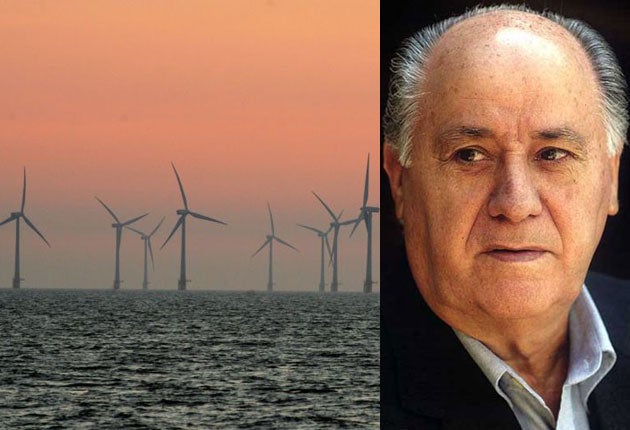From the high street to high winds: Zara boss bids to power the world

The self-effacing billionaire boss of Spain's Intidex textile empire, Amancio Ortega, who founded the Zara fashion chain, is taking a dramatic change of direction by creating a global alternative energy network.
As he did when he founded Zara over 30 years ago from his sister's kitchen table in La Coruna, Mr Ortega, Spain's richest man is launching his new venture modestly in his home region of Galicia, north-west Spain. But his ambitions are boundless and he has already established energy bridgeheads in three continents.
As chairman and chief shareholder of his company Capital Energy, Mr Ortega has produced a clutch of projects prompted by a tender offered by Galicia's regional ministry for innovation and industry, to provide up to 2,323 megawatts of energy from alternative sources, and set up some 20 energy parks. Mr Ortega reportedly intends to invest more than €2bn (£1.65bn) in his new venture over the next 18 months, with plans that extend far beyond Spain.
The move into renewable energy marks a dramatic turning point for the man who built a €30bn fortune by persuading Spanish women to love the beige trouser suit. His fashion revolution caught the mood of a nation emerging from dictatorship, whose young women relished new-found freedoms. His formula of low-cost high-fashion conquered the world and continues to grow. A Zara shop, or one of its offspring, opens somewhere in the world every day and a half.
But after depositing chunks of his hefty fortune in research foundations, real estate and banking in recent years, Mr Ortega has now hit on renewable energy production on a world scale as the next big thing. One of the keys to Zara's success was the company's control of every step of production, from design, manufacture and distribution, to sales. It is a pattern set to repeat itself.
Next year, he plans to start building eolic parks, or wind farms, including those at sea, plants for the production of biofuels, and solar and photovoltaic energy plants. "Our plans cover development of projects from the outset. We will not be buying companies in operation, as often happens in the sector," says Jose Espinosa, Capital Energy's director of Strategy and Corporate Development.
As a country without coal, oil or gas, Spain has been keen to develop alternative energy sources, and solar panels and wind farms are a common sight. But such projects are mostly small-scale sidelines operated by Spain's huge energy conglomerates whose main interest is distributing imported fuels.
Recent interest shown in the Spanish energy company Repsol by the Russian energy giants Gazprom and Lukoil has brought home to Spaniards how politically vulnerable they may become to possible political pressure through their energy dependency. Mr Ortega's plans are well-laid, but their revelation yesterday, albeit low-key, in the Galician regional press, suggests that in energy, as in fashion, he is ahead of the curve.
Over the past year, Capital Energy has set up photovoltaic plants in the sunbaked Castilla-La Mancha region, and around Madrid, and is to erect wind farms across Spain in coming months. Mr Ortega has created 10 subsidiaries of Capital Energy to handle the energy produced, according to its source – biofuels, solar, wind – to take full advantage of subsidies for alternative energy. Capital Energy has already established a presence in Latin America, East Europe and India. But the plan is to draw in private capital to the tune of €100m in an operation masterminded Europe-wide by the private bank Edmond de Rothschild Europe. The aim, Capital says, is to expand throughout Spain and abroad. "Our immediate plans are to build 80 megawatt windmills, then 100 megawatt photovoltaic energy panels, and five thermosolar plants," Mr Espinosa says. "That will cost €300m to set up. In four or five years all will be in operation."
Projects include four biofuel plants using soya, rape seed and palm fibre planned for Seville, Bilbao, Cartagena, and Cadiz, to produce up to 250,000 tons a year; seven photovoltaic solar plants are being built, which will produce 0.7 megawatts. Bigger ones will be built in 2010, in Castilla-Leon, north of Madrid, and Catalonia. Wind generators of more than 2,000 megawatts will start going up next year, as plans are advanced for marine windfarms. Top of the list, where the enterprise was thought up, is wind-lashed Galicia.
Join our commenting forum
Join thought-provoking conversations, follow other Independent readers and see their replies
Comments
Bookmark popover
Removed from bookmarks